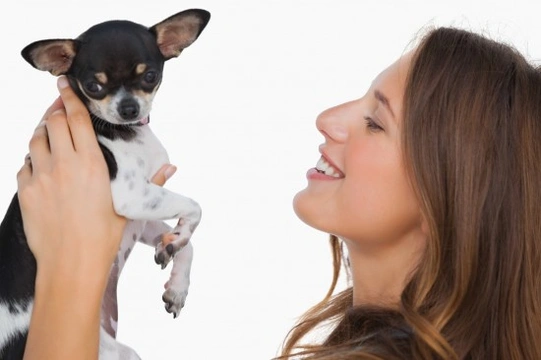Pets
Pets for studWanted petsBreedersAccessories & services
Knowledge hub
Support
Support & safety portal
How to manage a dog that won’t tolerate being picked up
If your dog is medium or large in size, the chances are that you have never needed to pick them up since their puppyhood, and that you probably wouldn’t be able to manage it even if you wished to! But for smaller dogs, such as toy dogs, lap dogs and other petite canines, being lifted up and carried is sometimes necessary, and this is something that all dogs of portable size should be used to, and happy with.
While there is no benefit to carrying a small dog everywhere and keeping them from walking on their own, in some circumstances, being able to pick your dog up is useful or even essential. Vet visits and trips to the grooming salon, walking through muddy or rough areas, and in interactions with other dogs, sometimes, small dogs need to be lifted up, and this should be a fuss-free matter of course for both you and your dog.
But if your dog growls, snaps or generally appears to be unhappy when being lifted, this can pose a problem in terms of both potentially making it difficult to lift your dog, and even risky. If this is the case for you, then read on to learn more about why a dog may refuse to tolerate being lifted up, and what you can do about it.
Picking your dog up properly
If your dog is of a size that you should be able to lift up and this may be necessary in the future, it is important to get your dog used to it while they are still young. Lift them by supporting the chest and hind legs so that your dog feels secure, and when they are off the ground, hold them close but gently next to your body.
Never pick your dog up by the scruff of the neck, by lifting them off the floor by their collar or lead, or by lifting them under the armpits.
Pain and health problems
If your dog suddenly objects to being lifted up when previously they have always been ok about it, the first thing to check out is whether there may be a health problem or injury causing your dog pain when picked up. A hurt or injured limb, spinal problems or anything else that causes pain when lifted will soon make your dog behave in a grumpy manner, as will internal issues that cause pressure to be applied when lifted.
Get your dog checked out by your vet in case there is an underlying cause for unhappiness when being picked up that you can do something about.
Being unused to handling
Most small dogs are used to being lifted up and handled, and view this as part of their normal life, but if your dog has not had the chance to get used to it, being whisked up off the floor suddenly can be unnerving!
Dogs that reach adulthood without getting used to being lifted may find it stressful and disconcerting, which can lead to growling, snapping or a tense posture. Being picked up can be scary, and if your dog has never got used to it, you will need to spend plenty of time and patience getting them familiar with being picked up safely and comfortably.
Rough handling or past experiences
Make sure that you are lifting your dog up properly, and not in such a way that you are causing them discomfort, pain, or to feel insecure. Lift them steadily but not swiftly, and never pick your dog up by their limbs or elbows.
Only one negative experience of being lifted up is required to put your dog off being picked up in future, and if your dog has a history or being hurt or scared when lifted up, or handled roughly, they are likely to avoid it in future.
Again, you will have to go back to basics in this instance, starting slowly and getting your dog used to being lifted gently and calmly without fright or pain.
Interruption
One common reason for picking up a small dog is to stop them from doing something that they want to do but shouldn’t; such as stalking potential prey, chewing something that they shouldn’t, or getting too rowdy with another dog.
Whisking them away from the action may prove to be a fast and effective way to stop your dog doing whatever it was that was causing a problem, but it can annoy your dog and make them less compliant in the future if lifting your dog up signals the end of play, a game, or something that your dog was enjoying doing.
Prevent this by ensuring that when you remove something from your dog or remove your dog by lifting them up, you offer an alternative reward and diversion, such as a favourite toy or a treat. This will focus your dog’s attention on the positive thing that they have received and not the negative feedback of losing the original thing, and keep them from viewing being lifted up as a bad thing.



